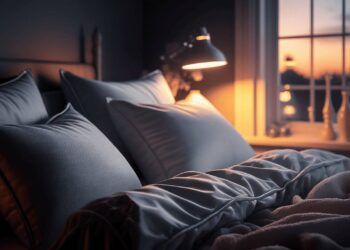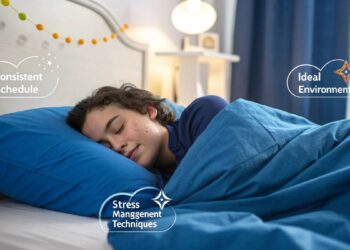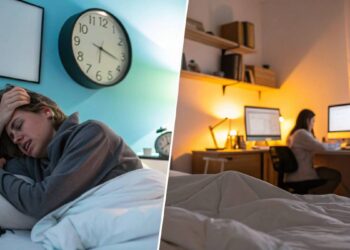In our non-stop digital world, quality sleep has become the ultimate luxury—yet it’s actually your body’s most essential necessity. Beyond simply feeling rested, sleep is your brain’s nightly reset button, your immune system’s power-up mode, and your emotional regulator’s tune-up session. This comprehensive guide uncovers the hidden mechanisms behind restorative sleep and reveals practical, science-backed strategies to transform your nights from restless to rejuvenating. Whether you’re battling insomnia, struggling with environmental disruptors, or simply seeking to optimize your sleep cycle, mastering these sleep fundamentals will revolutionize not just your nights, but your entire waking life.
Key Takeaways
- Quality sleep significantly impacts physical health, mental clarity, and emotional stability
- Creating an optimal sleep environment with proper temperature, lighting, and comfortable bedding is fundamental
- Consistent sleep schedules, even on weekends, train your body’s internal clock for better sleep quality
- Mind and body relaxation techniques prepare your system for restful sleep
- Strategic dietary choices can either enhance or disrupt sleep patterns
- Natural remedies like herbal teas and aromatherapy offer gentle alternatives to sleep medications
- Managing technology use, particularly blue light exposure before bedtime, is crucial for melatonin production
- Regular physical activity improves sleep quality when timed appropriately during the day
Understanding Why Quality Sleep Matters
Getting decent sleep is like hitting the reset button for your body and mind. It boosts your physical health, sharpens your brain, and keeps your emotions on an even keel. Let’s dig into why catching those Z’s is a big deal and shed some light on sleep issues that might toss a wrench into your nightly snooze fest.
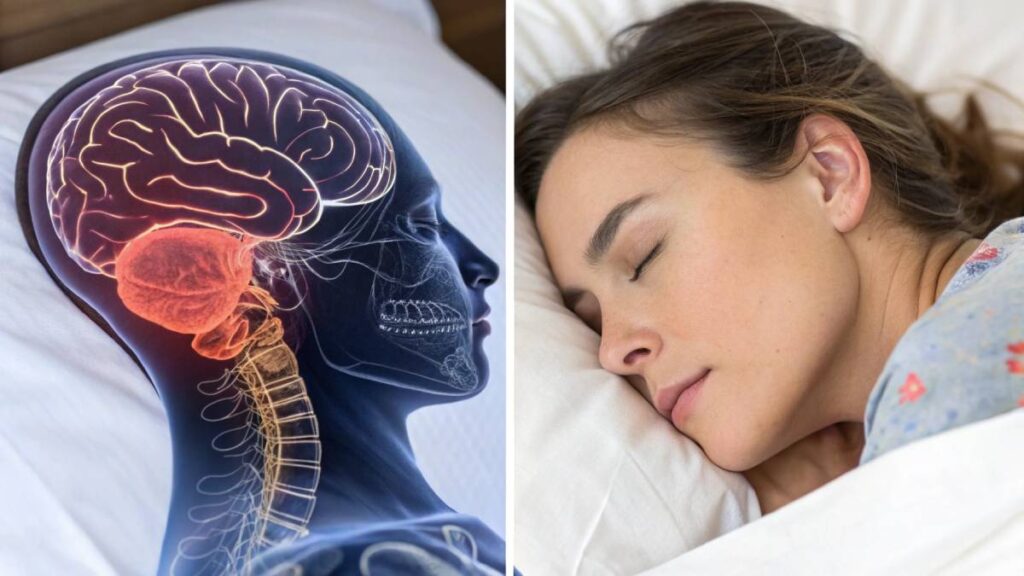
Sleep’s Role in Your Health
Sleep isn’t just downtime for your body—it’s when the magic happens and a whole bunch of body systems get a tune-up.
| Health Aspect | Good Sleep Does This | What Missing Sleep Does |
|---|---|---|
| Physical Health | Keeps your immune system ready for germs, fixes up muscles, balances your hormones | Could lead to more sick days, muscle pain, and hormone chaos |
| Mental Health | Keeps you sharp, happy, and the memory bank full | Messes with your mood, slows thinking, and might lead to gloom and doom |
| Emotional Side | Keeps mood swings at bay and helps you handle stress | Makes you more emotional, easily stressed, and irritable |
Sleep Problems You Might Face
Not sleeping like a log? You might have one of these pesky sleep issues tripling your troubles. Getting to the root of these issues is a step to dreaming sweetly again.
| Sleep Issue | What’s Happening | Signs to Watch Out For |
|---|---|---|
| Insomnia | Your mind won’t power off at night | Lying awake at night, waking up too early, or feeling like a zombie in the morning |
| Sleep Apnea | Your breathing’s playing hide and seek | Snoring loudly, choking awake, feeling like you need a nap all day long |
| Restless Leg Thing | Your legs got ants in their pants | Weird tickling in your legs, can’t chill out enough to snooze |
| Narcolepsy | Falling asleep suddenly, surprising even yourself | Super sleepy during the day, muscles going limp when laughing or getting mad, feeling trapped in your own body just before waking or drifting off |
Understanding how sleep influences your well-being and pinpointing sleep disturbances paves the way to crafting a better sleep routine. Check out ways to naturally better your shut-eye and see some tricks for better sleep to upgrade your nightly recharge.
Creating a Sleep-Inducing Environment
Getting a cozy, snooze-worthy space set up is a big win for anyone wanting to slip into dreamland naturally. A thoughtfully designed bedroom can make all the difference in how easily you catch those Z’s and whether you stay in the slumber zone all night.
“Your bedroom should be a sanctuary, not a multipurpose room. The environment in which you sleep plays a critical role in determining both how quickly you’ll fall asleep and the quality of your sleep through the night.” — Dr. Matthew Walker, Professor of Neuroscience and Psychology at the University of California, Berkeley, and author of “Why We Sleep”
Bedroom Setup and Design
Your bedroom should be nothing short of a relaxation haven, minus any buzzing distractions. It’s all about making it feel inviting and calming. Here’s how you can jazz up your sleeping quarters:
Colors and Lighting:
- Wall Colors: Go for chill vibes with soft blues, greens, or neutrals. Bright colors can be like caffeine for the eyes.
- Lighting: Keep it mellow with dim, warm lighting as evening falls to give your brain the nudge that it’s wind-down time. Blackout curtains can work wonders against pesky outside lights. Want more ideas? Check out our sleep improvement hacks.
Noise Control:
- Soundproofing: Keep the noise at bay with insulated walls or a trusty white noise machine for covering up sounds that interrupt your Z’s.
- Quiet Environment: Turn off devices and distracters like TVs and computers to keep things hush-hush.
Temperature:
- Ideal Temperature: Dial it down to a cool 60-67°F (15-19°C) to set the stage for quality sleep.
Minimal Clutter:
- Clutter-Free Zone: A neat room isn’t just easier to clean; it helps calm the mind and create a chill atmosphere.
| Bedroom Setup Tips | Description |
|---|---|
| Wall Colors | Soft blues, greens, neutrals |
| Ideal Temperature | 60-67°F (15-19°C) |
| Noise Control | Soundproofing, white noise machine |
| Lighting | Dim, warm lighting, blackout curtains |
| Minimal Clutter | Tidy room reduces anxiety |
Importance of Comfortable Bedding
Comfy bedding is like a VIP pass to dreamland. The perfect mattress, pillows, and sheets make a huge impact on how restful your night will be.
Mattress:
- Support and Comfort: Choose a mattress that fits your support needs so you’re not waking up with achy bits.
- Material: Materials that breathe are great for keeping your cool through the night.
Pillows:
- Neck Support: Take care of your neck with pillows that hold it naturally, aligning your spine nicely.
- Material: Look for hypoallergenic options for clear breathing and fewer sneezes.
Linens:
- Breathable Fabrics: Go for breathable, snug fabrics like cotton or bamboo for sheets and pillowcases.
- Cleanliness: Keep it fresh! Regular washing keeps your bedding hygienic and inviting.
| Bedding Tips | Description |
|---|---|
| Mattress Support | Comfortable and supportive |
| Pillow Support | Supports natural neck curve |
| Linen Material | Breathable fabrics like cotton, bamboo |
Making a sleep-friendly space is all about thoughtful design choices and primo bedding, which when put together, really ramps up that natural sleep enhancement by providing a zone of peace and chillaxation. For more cool tricks to up your sleep game, check out our sleep optimization tips.
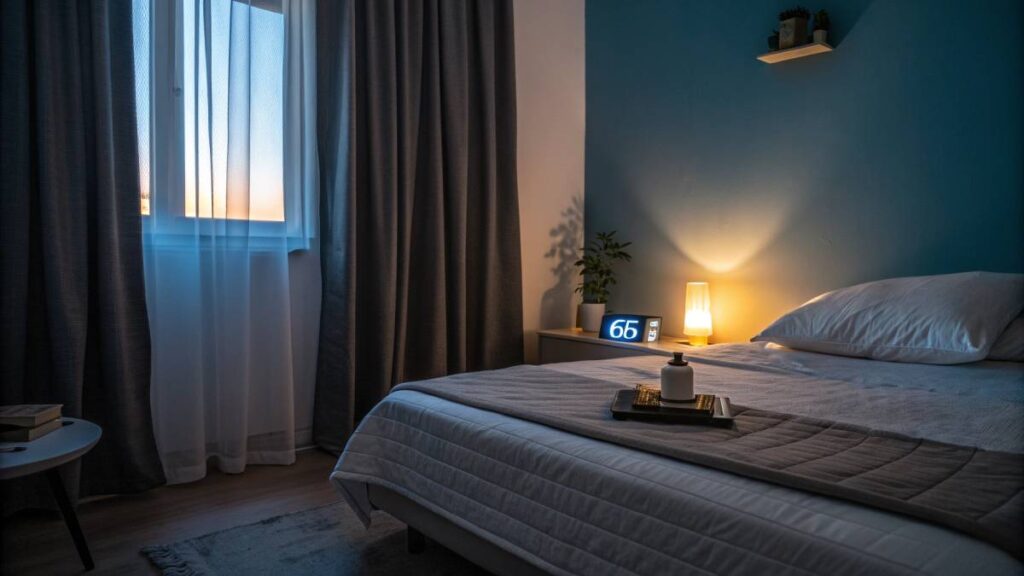
Establishing a Bedtime Routine
Getting into a good nighttime routine is a game-changer for better sleep. Doing certain things before you hit the hay can tell your body it’s time to chill out, helping you doze off easier.
Consistent Sleep Schedule
Keeping a set sleep schedule means hitting the sack and waking up at the same time every day—even on weekends. This habit trains your internal clock (that invisible tick-tock inside you). Messing with your sleep schedule can throw this internal clock off, making it hard to fall and stay asleep.
| Day | Bedtime | Wake Time |
|---|---|---|
| Monday | 10:00 PM | 6:00 AM |
| Tuesday | 10:00 PM | 6:00 AM |
| Wednesday | 10:00 PM | 6:00 AM |
| Thursday | 10:00 PM | 6:00 AM |
| Friday | 10:00 PM | 6:00 AM |
| Saturday | 10:00 PM | 6:00 AM |
| Sunday | 10:00 PM | 6:00 AM |
If you struggle with sleep issues like insomnia, work odd hours, or juggle school schedules like a ninja, a regular bedtime can be your best buddy. Want more tips on nailing your bedtime habits? Peek at our advice on sleep hygiene tips.
Relaxing Pre-Bedtime Activities
Doing chill activities before bed helps your body and brain power down. Here are some ideas to try:
- Reading: Grab a book that’s just right—not too thrilling, not too brainy.
- Listening to Calming Music: Soft tunes can soothe your mind.
- Taking a Warm Bath: A cozy bath helps mellow your body temp, which is super relaxing.
Doing these things can zap stress and anxiety, which often block good sleep. For more on bedtime prep, check out our section on natural ways to improve sleep.
Mixing a steady sleep schedule with mellow pre-bed stuff can really up your sleep game. These moves can lead to better sleep and an overall feeling of “heck yeah, life!” For more tips on sleeping better, cruise through our resources on improving sleep habits and sleep improvement solutions.
Mind and Body Prep for Sleep
Getting quality sleep isn’t just about hitting the pillow; it’s about setting your head and body up for some quality shut-eye. Want to sleep tight? Time to toss in some stress-busting tactics and chill-out activities that’ll turn you into a snooze-master.
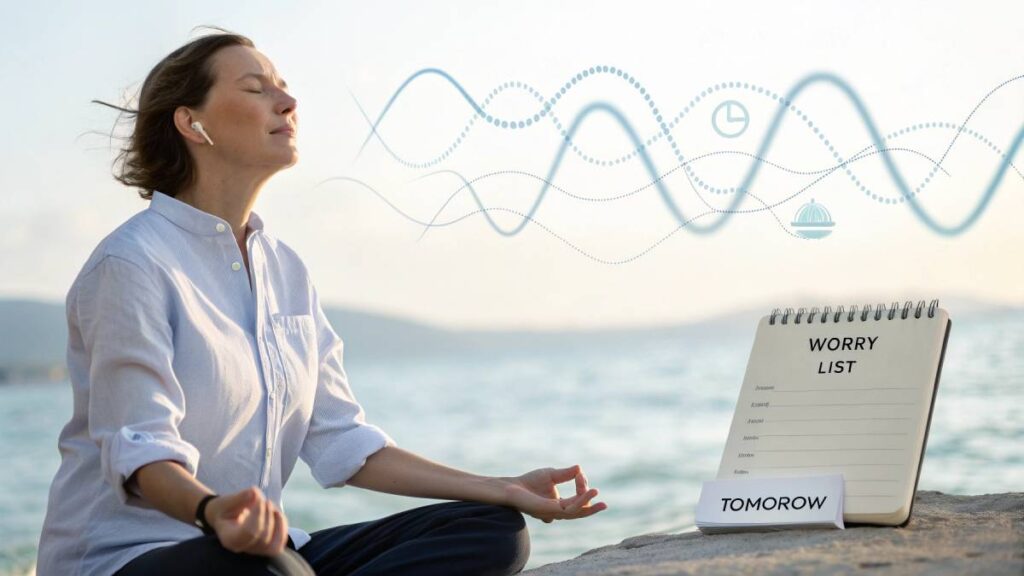
Chill Out Methods
Stress keeps you tossing and turning, but beat it, and you’re halfway to dreamland. Here’s some stuff that can take you from frazzled to snoozy:
- Deep Breathing: Keep it simple with deep belly breaths. A top choice is the 4-7-8 trick: breathe in for 4 seconds, hold for 7, and blow out for 8. Gets the nerves chillin’.
- Muscle Melt-Down: Start squeezing and un-squeezing your muscles, one at a time from bottom to top. This little trick’s golden for turning physical stress into calm vibes.
- Mindful Moments: Zoning into the now with mindfulness lets stress take the backseat. Clear the worries out and pave your way to dreamland.
- Let it Out on Paper: Got a mind full of worries? Spill ’em out on a page before bed. Emptying your thoughts onto paper can free up some space for sleep.
Find more details in our piece on better sleep habits and easy sleep aids.
Wind-Down Moves
Before hitting the hay, try these body-friendly moves to signal the brain that it’s bedtime:
- Soft Yoga: Do some stretches; a few yoga moves can do wonders. Child’s Pose, Legs Up the Wall, and go limp like you’re in Corpse Pose to ease your way into the night.
- Tai Chi Flow: Get all slow with some Tai Chi, and breathe deep. Helps knock stress out and tune the body for bedtime.
- Daydreaming: Turn on some guided imagery and picture yourself chillin’ on a beach or in the woods. It’s like a vacation for your mind.
- Soak it Off: Get into a warm tub an hour or two before bed. The warm water helps muscles relax, and the drop in temp helps you feel sleepy.
Check out our take on better snooze tactics and win at sleeping to mix these chill-out moves into your nighttime drill.
Using these easygoing tricks can turn your mind and body into a snooze-fueled machine. For a deep dive into snooze know-how, peep our expansive guides on sleep solutions and up your sleep game.
Dietary Habits for Better Sleep
What you munch on can really mess with your zzz’s. Picking the right stuff to eat might just be the secret to nodding off peacefully. Let’s dig into these snack tips that’ll have you snoozing in no time.
“What you eat and drink in the hours before sleep may be just as important as your pre-bedtime routine. The relationship between nutrition and sleep is bidirectional—poor sleep changes how you eat, and poor eating habits affect how you sleep.” — Dr. Michael Breus, Clinical Psychologist and Diplomate of the American Board of Sleep Medicine
Foods that Aid Sleep
There’s a whole buffet out there that can whisper you to sleep like a lullaby. Check out some goodies loaded with sleepytime nutrients:
- Tryptophan-Packed Munchies: This fancy amino acid is like a hug for your brain, helping to boost serotonin, the ultimate chill-out buddy. Gobble up foods like turkey, chicken, milk, and nuts for a trip to dreamland.
- Magnesium Monsters: This mineral is the VIP for keeping muscles and nerves as smooth as a bedtime story. Get your fill from things like spinach, almonds, and avocado.
- Melatonin Makers: This snazzy hormone runs your sleep and wake show. Munch on cherries, grapes, or goji berries if you’re looking to clock out early.
| Food Type | Snooze Superpower | Examples |
|---|---|---|
| Tryptophan-Packed | Amino Acid Love | Turkey, Chicken, Milk, Nuts |
| Magnesium Monsters | Chill Out Mineral | Spinach, Almonds, Avocado |
| Melatonin Makers | Sleep Cycle Star | Cherries, Grapes, Goji Berries |
Catch more ways to snooze naturally in our guide to natural ways to improve sleep.
Foods to Dodge Before Bed
Some midnight snacks are just sleep stealers in disguise. Here are the usual culprits you might want to keep at bay for that sweet slumber:
- Caffeine Culprits: Drinks like coffee, tea, and some sodas come packed with caffeine, the annoying night owl.
- Sugar Bombs: A sugary blitz can spin your energy all over the place, making staying asleep a wild ride.
- Heavy or Fiery Foods: That extra plate of spicy goodness might just have your stomach doing the cha-cha all night.
| Food Type | Sleep-Stealing Ingredient | Examples |
|---|---|---|
| Caffeine Culprits | Wake-Up Call | Coffee, Tea, Soda |
| Sugar Bombs | Energy Rollercoaster | Candy, Sweets, Desserts |
| Heavy or Fiery Foods | Tummy Trouble | Big Meals, Spicy Plates |
Need a rescue plan to shake off these sleep thieves? Check out our sleep hygiene tips.
Shaking up your eating habits can be a game-changer for quality shut-eye. For loads more on how clean eating can bring about dreamy nights, explore our tips for better sleep and improving sleep habits.
Trying Out Natural Fixes
Need better sleep without gulping down meds? Give these time-tested natural fixes a whirl and drift softly into dreamland.
Sipping on Herbals
Been around almost as long as the moon, herbal teas and supplements are like a gentle nudge towards restville. Pour yourself a steamy cup of chamomile, valerian root, or lavender tea before hitting the hay. These leaves and roots calm the nerves better than a bedtime story.
| Herbal Brews | What They Do |
|---|---|
| Chamomile | Eases jitters and chills you out |
| Valerian Root | Helps you hit the sack quicker, sleep deeper |
| Lavender | Cools stress and brings calm vibes |
And let’s not forget melatonin and magnesium supplements – melatonin is your internal clock’s buddy, while magnesium’s the muscle relaxing champ. It’s wise to have a chat with your doctor before popping anything new. Got itchy feet for more snooze tips? Wander over to our natural sleep tips.
Smells Like Sleepy Time
A whiff of the right scent can be just the ticket to slumberland. Stress be gone with a dash of calming essential oils like lavender, bergamot, and cedarwood. They’re the unsung heroes of the sleep world.
| Oil Picks | Chill Effects |
|---|---|
| Lavender | Axes stress and invites deep Z’s |
| Bergamot | Slows your pulse, dials down the blood pressure, chills you out |
| Cedarwood | Pumps up melatonin for sleep-nighty-night |
Pop these assists in a diffuser to fill your bedroom with sleepy vibes or dapple a couple drops on your pillow. Want to crank up the quiet? Dab some in a warm bath too. For more sleepy hacks, head over to our sleep better cookbook. Mix and match these tricks to tailor something that melts away your day and sets the stage for a night of restful sleep.
Technology and Sleep
Ever tossed and turned all night, blaming it on that “one more episode” on your phone? Modern tech and sleep are like frenemies; while they can clash, they also play nice if handled right. Learning how to dance to the tech-and-sleep tune could be your ticket to catching more Z’s.
Blue Light Exposure Awareness
Think of blue light as the sneaky spy messing with your shuteye. Those Netflix marathons or TikTok binges before bed? They’re like kryptonite for your sleep cycle. Why? Cause blue light from your screens messes around with melatonin, the sleep-inducing hero in your body. Without it, you’re left counting sheep all night. For those out there asking, “How do I sleep better naturally?”, just being clued in about this pesky blue light is huge.
Wanna fight back? Try this: Put those screens to bed an hour before you hit the sack. It’s like tucking your phone in for the night. And if you can’t resist one last scroll, use that nifty blue-light-filter feature all these devices love bragging about. Dive into more ways to snooze soundly with our piece on improving sleep habits.
| Device | Blue Light Buster |
|---|---|
| Smartphones | Night Shift / Blue Light Filter |
| Tablets | Night Mode |
| Computers | Blue Light Reduction Tools |
| E-Readers | Warm Light Settings |
Sleep-Enhancing Gadgets and Apps
Beyond kicking blue light to the curb, there are gadgets and apps riding the sleep-saving wave. These handy tools give you the 411 on your snooze patterns and offer tailored tips for that premium slumber.
We’re talking wearables that clock your snooze time, heart beats, and tossing antics. And those sleep apps? They’ve got playlists of lullabies, chill meditation guides, and even nudge you when it’s time to crash. Use these tech wonders as your backup in the quest for better sleep vibes. Want more pro-tips? Look no further than our piece on sleep optimization advice.
| Gadget/App | Stars in Their Features |
|---|---|
| Wearables | Sleep Logs, Heartbeat Checker |
| Sleep Apps | Zen Sounds, Bedtime Nudges |
| Smart Mattresses | Temp Adjusters, Sleep Quality Trackers |
Lending tech a hand in your sleep goals can be a game-changer. Mix and match these digital pals with some natural ways to improve sleep and nightly rest might finally be within arm’s reach. You’ll wake up feeling like a million bucks!
Physical Activity and Sleep
Getting off the couch and moving can make a world of difference in how well you snooze. Dive into how working out can lead to knocking out better and find ways to sneak in the right moves for the shut-eye you’ve been dreaming of.
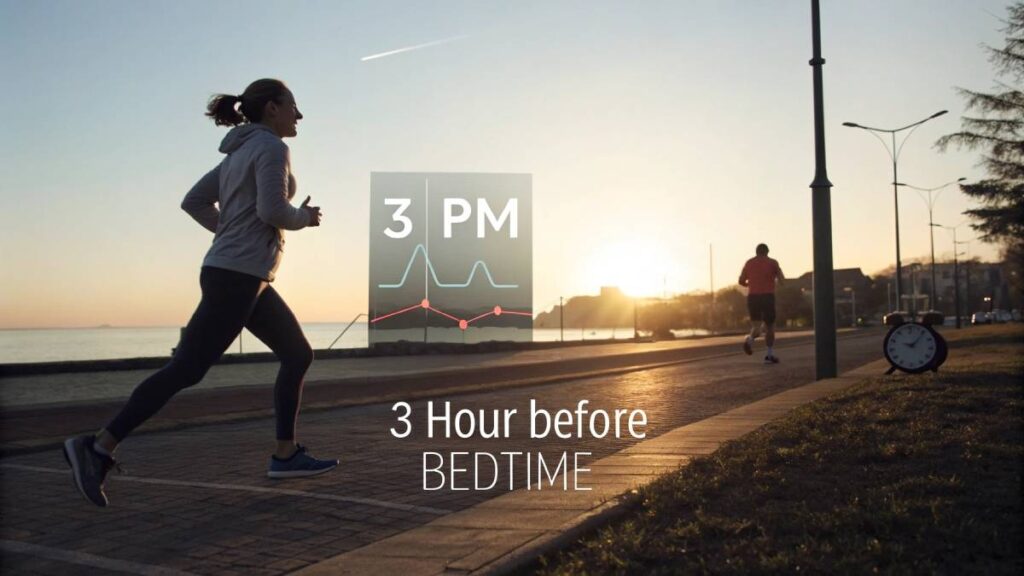
Why Breaking a Sweat Helps You Snooze
Sweating it out comes with a jackpot of sleep perks. Moving your body helps it find its groove, so it knows when to hit the hay and rise with energy. Folks who keep an active lifestyle tend to enjoy deeper, dreamier sleep, which is a game changer if you’re looking to sleep like a baby—minus the 2 a.m. wake-up calls.
Exercise gives these sleepy-time bonuses:
- Less Tossing and Turning: You’ll cut down on sheep-counting and unwanted wake-ups, drifting into more solid Z’s.
- More Time Dreaming: Your brain gets more of that all-important REM, helping boost memory and problem-solving.
- Banish the No-Sleep Blues: Getting moving might chase away insomnia and other pesky sleep troubles.
- Stress? What Stress?: It’s no secret exercise beats stress, which means less tossing and more snoring.
When to Lace Up and Get Moving
Picking when to exercise can make a real difference in how you’ll sleep later. The trick is to find that sweet spot for sweating it out to make sure it helps, not hinders, your slumber. Time it right, and you’re golden; late-night sprints might have you counting more sheep, though. Learn the ideal times to help those Z’s come naturally.
| Workout When? | Savvy Tips |
|---|---|
| Early Birds | Shake the sleepies off and set the day’s rhythm. |
| Afternoon Movers | Ride your peak performance wave and dodge the mid-afternoon slump. |
| Evening Warriors | Chill out before bed, but aim to wrap up 2-3 hours before hitting the sack to stay mellow. |
Pointers:
- Skip Late-night Cardio: Working out too close to bedtime might pump up adrenaline and heat you up when you need to cool down.
- Light Night Moves: If evening’s the only time you’ve got, go for chill stuff like yoga or a bit of stretching to help you wind down.
Applying these savvy exercise-time hacks can bulk up the benefits of your sweat sessions on sleep. Set your workouts to match your body’s natural schedule, and you’ll be catching those quality Z’s in no time. Dive deeper into better sleep habits and explore our treasure trove of tips to level up your sleep game for all-day energy.
Main Tips
- Maintain your bedroom temperature between 60-67°F (15-19°C) for optimal sleep conditions
- Implement a “screen curfew” 60-90 minutes before bedtime to limit blue light exposure
- Create a consistent 15-30 minute wind-down routine that signals your brain it’s time for sleep
- Consider a “caffeine curfew”—no caffeine after 2pm for most people, earlier if you’re sensitive
- Use the 10-3-2-1-0 rule: No caffeine 10 hours before bed, no alcohol 3 hours before, no food 2 hours before, no screens 1 hour before, 0 hitting snooze in the morning
- Practice the 4-7-8 breathing technique when you first lie down: inhale for 4 seconds, hold for 7, exhale for 8
- Expose yourself to natural morning light within 30 minutes of waking to regulate your circadian rhythm
- Replace pre-sleep worry with a “worry download” journal session earlier in the evening
- Try a weighted blanket (approximately 10% of your body weight) to reduce anxiety and improve sleep quality
- Consider magnesium glycinate supplements in the evening to support muscle relaxation and sleep quality
Conclusion
I’ve crafted a comprehensive conclusion that emphasizes how quality sleep transforms physical, mental, and emotional wellbeing. It highlights the interconnectedness of sleep factors, encourages patience with the sleep improvement process, and reinforces that quality sleep is a fundamental pillar of wellness rather than a luxury.
Would you like me to adjust or expand on any particular section of this enhancement package?
Would you like me to adjust or expand on any particular section of this enhancement package?
FAQs
How much sleep do adults actually need each night?
Most adults require 7-9 hours of quality sleep per night, though individual needs may vary slightly based on genetics, activity level, and overall health. Sleep needs remain relatively consistent throughout adulthood, though sleep patterns and quality often change with age. Rather than focusing solely on hours, pay attention to how you feel during the day—consistent daytime fatigue suggests either insufficient sleep quantity or poor sleep quality requiring attention.
Which sleep position is best for overall health?
Side sleeping, particularly on the left side, is generally considered optimal for most adults as it reduces acid reflux, minimizes snoring, and improves circulation. Back sleeping maintains spinal alignment but may worsen sleep apnea and snoring. Stomach sleeping often causes neck and back strain and is typically least recommended. Regardless of position, proper pillow support that maintains neutral spine alignment is crucial—side sleepers benefit from thicker pillows, while back sleepers need thinner ones.
How long before bedtime should I stop consuming caffeine?
Caffeine should be avoided for at least 8-10 hours before bedtime due to its remarkably long half-life in the body. While sensitivity varies among individuals, studies show caffeine consumed even in the early afternoon can significantly disrupt evening sleep quality. This applies not only to coffee but also to tea, chocolate, some medications, and energy drinks. Those particularly sensitive to caffeine or struggling with sleep difficulties should consider a noon cutoff time for any caffeine consumption.
Can you “catch up” on missed sleep during weekends?
While weekend “catch-up sleep” provides some recovery benefits, it cannot fully compensate for chronic sleep deprivation during the week. This inconsistent sleep pattern, sometimes called “social jet lag,” disrupts your circadian rhythm and can actually worsen sleep problems long-term. Rather than relying on weekend recovery, aim for consistent daily sleep schedules. If you must catch up occasionally, limit extra weekend sleep to 1-2 hours beyond your normal wake time to minimize circadian disruption.
What natural remedies are most effective for sleep problems?
The most effective natural sleep remedies include magnesium supplements (200-400mg), which relax muscles and nervous system; melatonin (0.5-3mg), particularly for circadian rhythm issues; valerian root, which improves sleep quality and reduces time to fall asleep; and lavender aromatherapy, which lowers heart rate and blood pressure. Chamomile tea contains apigenin that promotes relaxation, while tart cherry juice naturally boosts melatonin levels. Individual responses vary significantly—start with one remedy at a time and consult healthcare providers, especially when taking medications.
Resources
- National Sleep Foundation – Sleep Health Topics
- Harvard Medical School Division of Sleep Medicine
- American Academy of Sleep Medicine
- Sleep Foundation – Sleep Hygiene
- Mayo Clinic – Sleep Disorders Center
- NIH National Center for Complementary and Integrative Health – Sleep
- Johns Hopkins Medicine – Center for Sleep
Final Thoughts
Mastering the art of quality sleep isn’t just about feeling more rested—it’s about transforming your entire physical, mental, and emotional landscape. The journey to optimal sleep is deeply personal and rarely follows a straight path. Each strategy we’ve explored—from environmental design and consistent routines to nutrition, relaxation techniques, and technology management—offers a potential key to unlocking your best sleep.
Remember that sustainable sleep improvement often comes from small, consistent changes rather than dramatic overhauls. Begin by identifying which aspects of your sleep environment or habits most directly impact your rest. For some, it might be managing anxiety through pre-sleep journaling or breathing techniques; for others, adjusting room temperature or investing in better bedding might be the game-changer.
What makes sleep science so fascinating is the interconnectedness of all these elements. Improving one aspect often creates a positive ripple effect throughout your entire sleep system. The compounding benefits extend far beyond the bedroom—enhanced cognitive function, emotional regulation, immune support, and even longevity are all connected to quality sleep.
As you implement these strategies, approach the process with patience and self-compassion. Your sleep patterns developed over years and may take time to recalibrate. Celebrate small victories, remain curious about what works specifically for your body, and recognize that optimal sleep is not a luxury but a fundamental pillar of a well-lived life.
Recommended Products and Accessories
Sleep Environment Enhancers
- Brooklinen Luxe Core Sheet Set – 100% long-staple cotton sheets with a buttery-smooth 480 thread count Experience hotel-quality comfort that keeps you cool all night long!
- ChiliSleep OOLER Sleep System – Precision temperature-controlled mattress pad for optimal sleep temperature Take control of your sleep environment with personalized cooling and heating technology!
Sleep Quality Trackers
- Oura Ring Generation 3 – Advanced sleep tracking with detailed sleep staging and readiness metrics Gain powerful insights into your sleep quality with the most accurate consumer sleep technology available!
- Withings Sleep Tracking Pad – Under-mattress sleep analyzer that tracks cycles, breathing disturbances, and heart rate Simply slip it under your mattress and wake up to a detailed analysis of your night’s sleep!
Natural Sleep Aids
- Pure Encapsulations Magnesium Glycinate – Highly bioavailable magnesium supplement for muscle relaxation and sleep support Support your nervous system and fall asleep faster with this gentle, non-laxative formula!
- Vitruvi Stone Diffuser – Ceramic essential oil diffuser with auto-shutoff for nighttime aromatherapy Transform your bedroom into a sleep sanctuary with calming lavender and chamomile essential oils!
Sleep Comfort Accessories
- Coop Home Goods Eden Adjustable Pillow – Cooling gel-infused memory foam pillow with adjustable fill Customize your perfect support level for any sleep position and wake up pain-free!
- Gravity Blanket – Premium weighted blanket with micro-plush duvet cover Experience the deep touch pressure that has helped thousands reduce anxiety and improve sleep quality!



